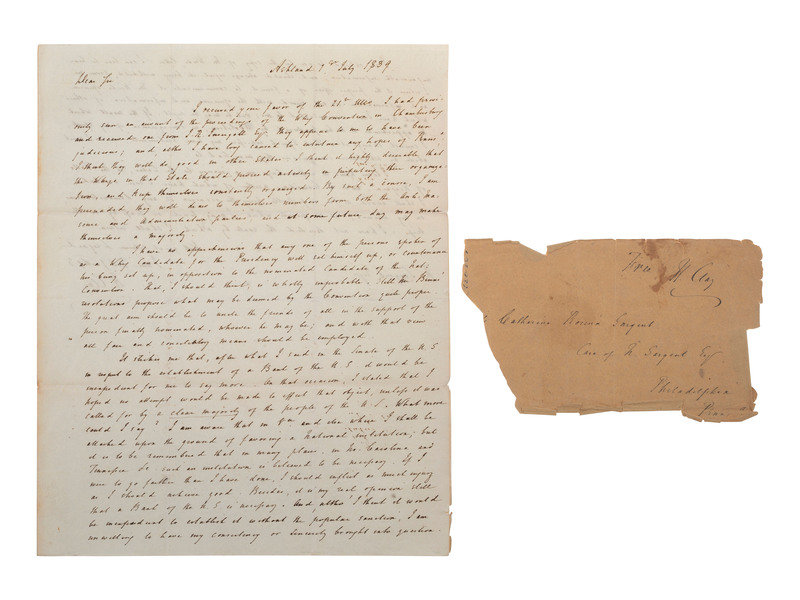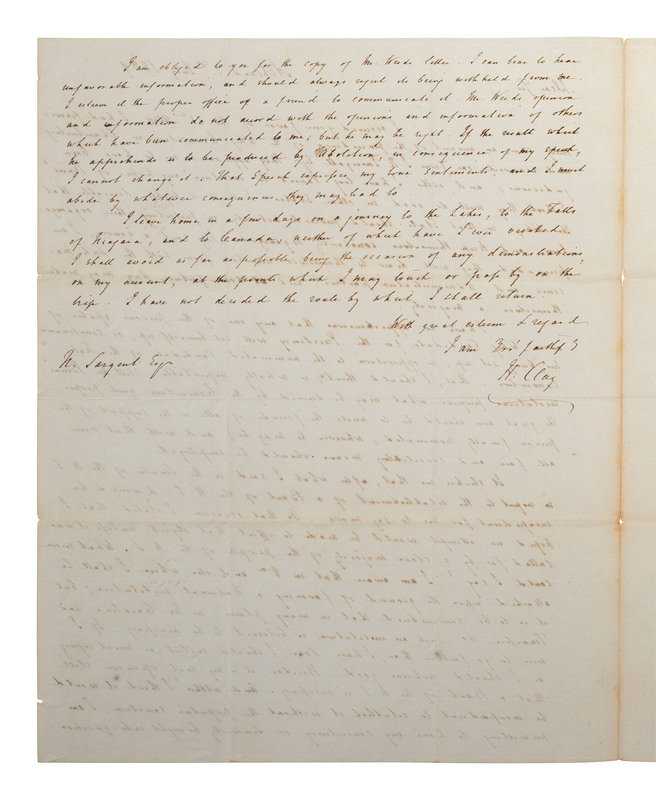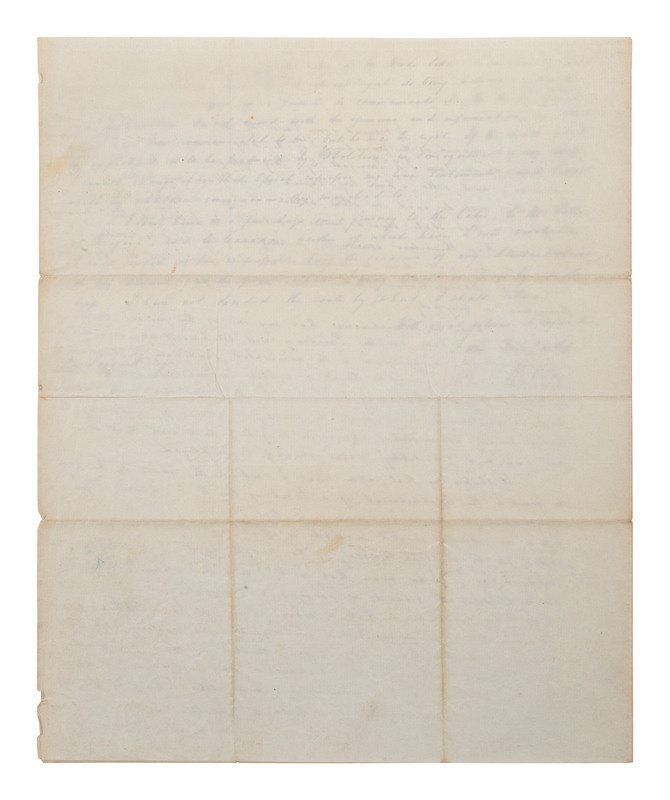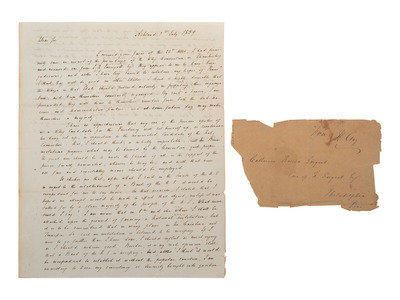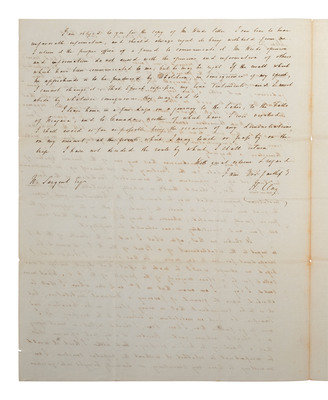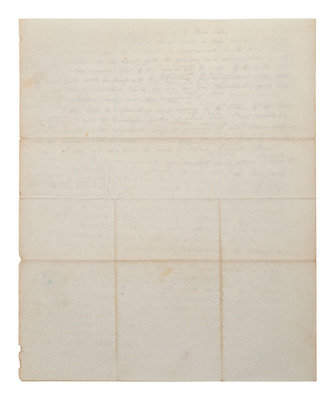[POLITICS]. CLAY, Henry (1777-1852). Autograph letter signed ("H. Clay"). "Ashland" [Lexington, KY], 1 July 1839. With free franked envelope.
Sale 1192 - American Historical Ephemera & Photography
Lots 1-294
Jun 15, 2023
10:00AM ET
Lots 295-567
Jun 16, 2023
10:00AM ET
Live / Cincinnati
Own a similar item?
Estimate
$400 -
600
Price Realized
$504
Sold prices are inclusive of Buyer’s Premium
Lot Description
[POLITICS]. CLAY, Henry (1777-1852). Autograph letter signed ("H. Clay"). "Ashland" [Lexington, KY], 1 July 1839. With free franked envelope.
2 pages, on bifolium, 8 x 10 in., creased throughout, with some staining and chipping/tears to right edge. With partial free franked envelope signed ("H. Clay") with heavy loss.
In this letter to N. Sargent, Esquire, the editor of a Whig paper in Philadelphia, Clay responds to accounts he has received about the Whig Convention in Chambersburg, which he says "appear to me to have been judicious..." He writes, "...I am persuaded, they will draw to themselves numbers from both the Anti-Masonic and Administration parties, and at some future day may make themselves a majority."
He goes on to comment on his past comments in the US Senate regarding the establishment of a national bank, which he realizes will draw strong criticism from some states like Virginia, and potential support from others like North Carolina and Tennessee. In part, "On that occasion, I stated that I hoped no attempt would be made to effect that object, unless it was called for by a clear majority of the people of the U.S. What more could I say?...If I were to go farther than I have done, I should inflict as much injury as I should achieve good..."
Clay lastly thanks Mr. Sargent for a copy of a letter from a "Mr. Weed," which was apparently critical of Clay, specifically a speech he gave (likely the one he gave to Congress on 7 February 1839) in which he calls out the dangers of Abolition. He writes, "I can bear to hear unfavorable information, and should always regret its being withheld from me...Mr. Weed's opinion and information do not accord with the opinions and information of others which have been communicated to me; but he may be right. If the result which he apprehends is to be produced by Abolition, in consequence of my speech, I cannot change it. That speech expresses my true sentiments; and I must abide by whatever consequences they may lead to."
Accompanied by a transcription of letter.
William Henry Harrison was chosen as the Whig nominee for President in the 1840 election. Winning the election, he became the first of only 2 victorious candidates to come from the Whig party.
In this letter to N. Sargent, Esquire, the editor of a Whig paper in Philadelphia, Clay responds to accounts he has received about the Whig Convention in Chambersburg, which he says "appear to me to have been judicious..." He writes, "...I am persuaded, they will draw to themselves numbers from both the Anti-Masonic and Administration parties, and at some future day may make themselves a majority."
He goes on to comment on his past comments in the US Senate regarding the establishment of a national bank, which he realizes will draw strong criticism from some states like Virginia, and potential support from others like North Carolina and Tennessee. In part, "On that occasion, I stated that I hoped no attempt would be made to effect that object, unless it was called for by a clear majority of the people of the U.S. What more could I say?...If I were to go farther than I have done, I should inflict as much injury as I should achieve good..."
Clay lastly thanks Mr. Sargent for a copy of a letter from a "Mr. Weed," which was apparently critical of Clay, specifically a speech he gave (likely the one he gave to Congress on 7 February 1839) in which he calls out the dangers of Abolition. He writes, "I can bear to hear unfavorable information, and should always regret its being withheld from me...Mr. Weed's opinion and information do not accord with the opinions and information of others which have been communicated to me; but he may be right. If the result which he apprehends is to be produced by Abolition, in consequence of my speech, I cannot change it. That speech expresses my true sentiments; and I must abide by whatever consequences they may lead to."
Accompanied by a transcription of letter.
William Henry Harrison was chosen as the Whig nominee for President in the 1840 election. Winning the election, he became the first of only 2 victorious candidates to come from the Whig party.
Property from the James Milgram, M.D., Collection of Broadsides, Ephemeral Americana, and Historical Documents
Condition Report
Auction Specialist
